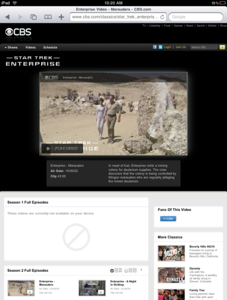CBS.com is experimenting with HTML5 video, the plugin-free video technology supported by Apple mobile devices including the iPhone and iPad. With HTML5 running on the CBS website’s back-end, visitors from these and other Internet-connected devices could stream videos without having to install the Adobe Flash plugin, something that Apple CEO Steve Jobs is known to be vehemently against, having penned a public statement giving half a dozen reasons why Apple mobile devices won’t include its support.

According to CBSi’s SVP and GM of entertainment, Anthony Soohoo, CBS.com plans to reach HTML5 parity with the plugin-based Flash video, but is still trying to find the right mix of tools in order to do so.
How appropriate that these current tests utilize Star Trek Enterprise episodes for the experiments with this futuristic video technology.
CBS.com Tests HTML5, but Still Not iPad-Ready
Staci Kramer of MocoNews caught up with Soohoo in the hallways of the ongoing video game conference E3 to ask him about the apparently iPad-friendly videos she had inadvertently stumbled upon.
He told her, “What you see right now is a small, little experiment,” and one that, as of this moment, appears to only be partly functional in our own tests. Select Star Trek videos now appear with overlaid buttons that read “play video” – an improvement at least over the blank pages informing you that the videos aren’t supported on your device. However, click the “play video” button and nothing happens. No Star Trek, no spaceships, nothing but a play arrow button with a line over it.

This isn’t the first time CBS.com has been caught running HTML5 video tests on its public site, a decision that either implies limited resources for internal testing or, perhaps, a desire for media attention.
In March of this year, CBS.com ran another HTML5 experiment, just prior to the iPad’s release. At that time, numerous bloggers caught glimpse of video tests both on the CBS.com homepage and elsewhere on the site. The captions alongside these videos read, tantalizingly, “iPad – test,” giving no doubt as to the reasons why CBS.com was toying with the new technology.
When pressed for comment, CBS.com would only say that the company was “ready to test any idea that brings that content to the widest possible audience.”
HTML5 Support Goes Beyond iPad
The iPad’s potential to help sites reach the “widest possible audience” is still up for debate. On the one hand, analysts believe Apple will sell 7 to 8 million units this year. And, so far, sales are strong, especially considering the economy and the device’s “luxury” status. As of May 31, Apple announced it has sold more than 2 million iPads worldwide in only 60 days. However, not everyone is convinced of the iPad’s game-changing potential. News reporter for the blog TechCrunch, Sarah Lacy, recently called the iPad “a beautiful toy,” citing survey data from U.K. consulting firm YouGov, which found that the majority of iPad owners (98%) already own another Apple product, a trend that implies, as she sees it, it’s a device that does not “reach across the aisle” to attract a wide, mainstream audience.
While that may end up being true for the iPad itself – it’s too soon to say – the tablet form factor is being touted as the next major breakthrough in computing. According to the latest Forrester research report, nearly one in four personal computers sold by 2015 will be a tablet. And it’s likely that tablets, en masse, will go the way of the iPad when it comes which technologies they will support or reject, especially, for example, battery-intensive plugins like Adobe’s Flash. In other words, betting on HTML5-enabled video isn’t just a vote for the iPad, it’s potentially a vote for computing’s future.
We asked CBS.com about this new round of video tests and, this time, received a more informative response. According to a company representative, the Star Trek episodes were part of ongoing experiments, which is why they may have been functional earlier today but are now broken. It’s unknown at this time when or if they will work again.

















